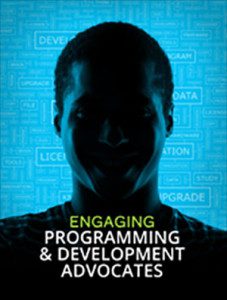They are the quiet, focused individuals, eyes glued to the screen 24/7 as they create and tweak seemingly incomprehensible code. That’s who the programmer/developer is to most.
At least that’s how they’re portrayed on TV. And to a degree, that’s absolutely correct. But there’s more than meets the eye to these highly intelligent personas.
In the fourth post in our multi-part series on how to engage with pros from different industries, we reveal how you turn programmers and developers into loyal advocates for your brand.
Who is the programmer/developer?
First off, don’t call them “IT professionals.” Just like Liam Neeson in the movie Taken, they have “a very particular set of skills.” (Though their skills are much different, not to mention less frightening, than Neeson’s in the flick.)
Yes, much like IT pros, their jobs typically involve solitary work, making them more introverted than the average person. A study entitled An Improved Assessment of Personality Traits in Software Engineering confirms that software programmers rank high in cognitive capabilities, but low in extraversion. And they are also equally as eager to learn. But they view their work more like a painter might view his latest creation – except the computer is the canvas, and his key strokes the brush.
It’s not all Greek to them
Their brains work in mysteriously fascinating ways. They view code – a series of letters, numbers, and symbols – just as normally as you or I might see words on the page of a book.
They are perfectionists
In the book Programming Perl, author Larry Wall names laziness, impatience, and hubris as the three great virtues of programmers. But it’s not what you think. They’re lazy in that they create great programs that they can easily reuse the code; write programs with minimal code to avoid having to patiently answer too many questions; and have an inherent need to be admired by peers, which means working to build code that can’t be picked apart.
Show me some love!
Programmers and developers are often underappreciated. It’s sort of like a cook who gets all the credit for a beautiful dish while no one asks who actually devised the recipe.
Addressing their concerns
So how do you best reach this group that presumably speaks a language you could never begin to understand?
Do your research
Put in some time to actually learn about what they do. This will help you provide valuable insights, tips, and tricks. Of course you can’t be expected to read a language you don’t understand, so pick the brain of a developer you know who might be able to break things down in a way you can digest and leverage in your program.
Cool it on the marketing fluff
Clever marketing jargon, fluff, and hyperbole won’t work on this group. Approach them openly and candidly, be factual, and to the point. This will help develop trust. As soon as you can be relatable on some level, it will help break down their guard and build a strong relationship.
Building loyalty
The good part is that once you deliver value, programmers and developers tend to be a loyal bunch. Once they feel you’ve actually taken the time to understand their craft, they’ll appreciate the content you provide to help them perfect, or at least improve, it.
Ask and ye shall receive
Chances are, programmers and developers have plenty of opinions on plenty of matters – they just need to be asked. Open up those floodgates, and ask for their views on hot topics. Preferred methods include online communities and forums, as well as short surveys.
Feed the ego
Given them a platform to share ideas and mentor others – a place where they can be considered an expert in the field. There is generally a strong culture of sharing and mentorship among developers. Help facilitate those conversations and it’s sure to deliver value.
Bottom line
Programmers/developers are quiet, focused, and dedicated. They are eager to develop and share their knowledge. They’re opinionated and, when given a platform to share those opinions, they will. Your key challenge is gaining an understanding of their work such that you can deliver relevant messages, and build up a level of trust and relatability. Once there, this persona has the potential to be some of your most loyal advocates.
 New eBook series: Engaging Your Advocates
New eBook series: Engaging Your Advocates
This new eBook series, which will be released throughout early 2015, explores the art and science behind engaging advocate marketing programs, including:
- Insight into the advocate persona (e.g., IT, HR, sales, etc.)
- Key challenges and how to address them
- How to position your asks effectively
- Sample challenges from real advocate marketing programs
- Tips from marketers who have experience working with this persona
Sign up now to receive the eBook(s) most relevant to you as they are released!











































